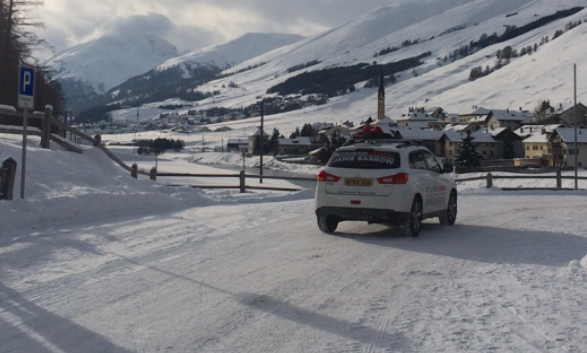Driving to the Alps for your ski or snowboard holiday can make a lot of sense. Especially if you are taking the family and travelling at peak holiday periods, as it can work out a lot cheaper than flying or taking the train and you don’t have to worry about luggage restrictions.
Car Safety Pack
It is a legal requirement in France, to have in the car a reflective safety vest/jacket, breathalyser and a warning Triangle. You will also need diffuser stickers for your car’s front lights and possibly a GB sticker. It is also a legal requirement to carry snow chains if you are driving on mountain roads and it is a very good idea to get proper winter tyres fitted.
Road Tolls
For motorway driving in France you will need to take into consideration road Tolls. Of course, it does depend on what part of the Alps you are travelling to, but as a rough estimation it will cost about £55-60 each way. The majority of the mountain tunnels are free of charge but there is a charge on some of the longer ones. There are often alternative routes over the mountains but can take you a lot longer so it is best to weigh up the options and work out what you are going to do before you leave.
The toll stations have fast track lanes where you do not even have to stop the car. To use these, you have to purchase a Sanef Liber-T tag, which is a unit that sticks onto your windscreen and allows for the toll barriers to open automatically when you approach one. You will then be invoiced and the costs deducted from your credit card each month.
This really is worth getting as the Toll queues can be horrendous. Visit the Sanef Liber-T site for more info
Sat Navs
Unless you want to wind down the hours with countless arguments about map reading skills (this is an age old game for married couples) then I highly recommend that you purchase a Sat Nav with a European map.
Plan Your Route
Having said that , it is never a good idea to overly rely on technology and I would advise on planning the route first and having maps in the car.
Car Insurance
Make sure that your car insurance covers driving in Europe. Quite often you will have to pay a small surcharge for this.
Sort out your Playlist
Tunes! It is a long journey snaking your way down through France and unless you are partial to French radio stations, you are better off sorting out your own playlist.
DVD Players
Okay, so it is not essential, but If you are travelling with kids and your car is not already fitted with a complete media centre that will rival an Apple store, it is a great idea to invest in DVD screens that fit onto the back of the headrests.
12v car charger 3-way Extensions
Off course, if you have pimped up your car with a mini media centre then you will need to power all these devices! The best way to deal with this is to buy a 12v 3-way extension socket for your car’s12v charger. They normally also come with a couple of USB sockets as well, so you can charge your mobile(s).
Water and Snacks
It’s a long trip so make sure that you have plenty of water and snacks. Believe me, Haribos can be a life saver!
Also, if you intend to arrive at your resort late in the evening, it may be a good idea to make sure that you have something to eat for when you arrive (and a bottle of wine!).
If you have a snowboard – Take off the Bindings
It is a rookies mistake to try and stuff snowboards in to a packed car without taking off the bindings.
Split the Journey
If you are taking kids, it is a good idea to split the journey over 2 days and stay overnight at a motel, as a 12 hour journey can be too much for the little ones and not good if they are starting ski lessons the next day. A popular place to stop-over in France is Reims (East of Paris).
Pit Stops
Have a lot of stops en-route. The journey can be gruelling for the driver and a short stop every few hours can make all the difference. It also makes sense to share the driving if you can.
